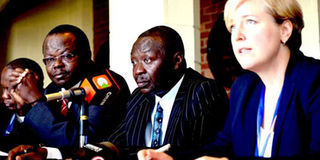IAEA lauds Kenya plan to generate nuclear power

From left: Kenya Nuclear Electricity Board CEO Ochillo Ayacko, Energy Principal Secretary Joseph Njoroge and IAEA Senior Adviser, Nuclear Energy Department, Anne Starz address the media during a joint meeting in Nairobi on August 23, 2015. IAEA has lauded the steps Kenya has taken in its plan to generate nuclear electricity. PHOTO | SALATON NJAU | NATION MEDIA GROUP
What you need to know:
In their meeting with the government of Kenya, the experts also highlighted areas where further action is required.
They include the establishment of key goals and requirements to guide the programme and introduction of a legal and regulatory framework.
Kenya needs to set up an independent regulator for nuclear electricity, the team said.
The UN nuclear energy regulator has lauded the steps Kenya has taken in its plan to generate nuclear electricity.
In its verdict after an eight-day review, the International Atomic Energy Agency (IAEA) on Monday said Nairobi had made "significant progress in its preparations to make a knowledgeable decision about introducing nuclear power".
The 10-person team — comprising experts from South Africa, Spain and the United Kingdom as well as IAEA staff — stated that Kenya had made notable progress in training, stakeholder involvement and review of infrastructure requirements.
“Kenya has given thorough consideration to the infrastructure that will be necessary should the country decide to proceed with the development of a nuclear power programme,” head of Integrated Nuclear Infrastructure Review Jose Bastos said at a press conference in Nairobi.
ACTION AREAS
In their meeting with the government of Kenya, the experts also highlighted areas where further action is required.
They include the establishment of key goals and requirements to guide the programme and introduction of a legal and regulatory framework.
Kenya needs to set up an independent regulator for nuclear electricity, the team said.
Kenya Nuclear Electricity Board Chief Executive Officer Ochillo Ayacko said they would speed up the formation of a regulator to license operators and oversee their operations.
“Legislation on the establishment of a nuclear regulator is our top most priority. The journey towards energy security for our country occupies high consideration in the national government’s plans,” he said.
He said officials had drafted a Bill seeking to convert the board into an institute that would carry out additional duties like nuclear research and training.
CLEAR SIGNAL
“We have met MPs over this Bill. There is a clear signal that the government intends to take this debate forward. Nuclear is a knowledge area and capacity building is essential,” he said.
Mr Ayacko said the project would provide affordable, reliable, competitive and safe electricity for Kenyans and significantly contribute to the government’s development agenda.
Mr John Omenge, chief geologist at the Ministry of Energy, said diversifying into other sources of energy would reduce the cost of goods and services.
Kenya plans to set up a first nuclear power plant, with a capacity of 1,000MW, by 2025.
This is expected to rise to a total of 4,000MW by 2033, making nuclear electricity a key component of the country’s energy mix, which is projected to be about 19,000MW in total.
Kenya currently has an installed capacity of 2,298MW.




